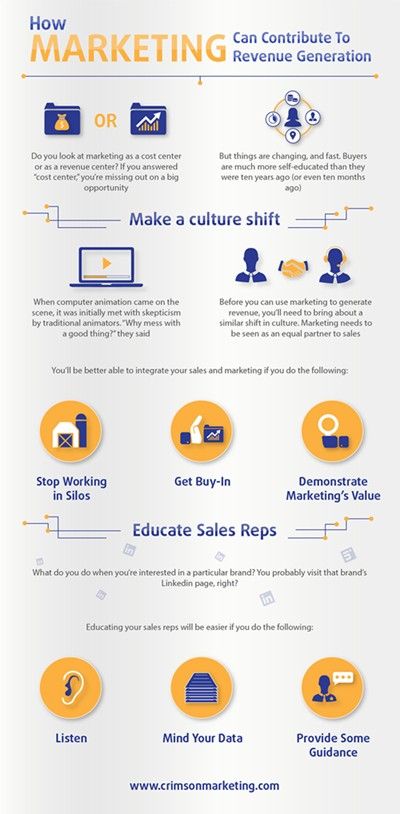Do you look at Marketing as a cost center or as a revenue center? If you said "cost center," you're missing out on a big opportunity. Don't feel bad, though; for a long time, Marketing has been seen as just that—a necessary but costly part of doing business.
Revenue? How could Marketing actually contribute to that?
But things are changing, and fast. Buyers are much more self-educated than they were 10 years ago (or even 10 months ago). They've studied up, they're Internet savvy, and they're turning to social media and communities, including LinkedIn and Twitter, to see what people are saying about brands.
They're so knowledgeable, in fact, that many business buyers have already made a decision about what they're going to buy even before talking to a vendor.
Sales needs to adapt in response if it's going to be on equal footing with the buyer. Luckily, Marketing has a wealth of knowledge at its disposal to help Sales do just that.
Marketing can enable sales reps to be as educated as buyers are so that Sales knows exactly where the buyers are and can help them move forward in their journey toward a buy.
In short, Marketing can help sales reps to better do their job and, in turn, it can actually have an impact on revenue generation.
Make a culture shift
When computer animation came on the scene, it was initially met with skepticism by traditional animators. "Why mess with a good thing?" they said. "That isn't going to last." Over time, however, the ease of use and the value of computer animation gave it an edge of traditional animation, and now it's the industry standard.
Before you can use marketing to generate revenue, you'll need to bring about a similar shift in culture. Marketing needs to be seen as an equal partner to Sales. Easier said than done, however: You're fighting with decades of commonly held beliefs. Sales needs to be made aware of the dramatic shift in buyer aptitude, and Marketing needs to step in and do some of the heavy lifting.
You'll be better able to integrate your sales and marketing organizations if you do the following:
- Stop working in silos: Sales and Marketing fulfill unique roles, and you can't have one without the other. But there's no need for them to exist in separate organizational silos. You need to break down the barriers between the two to facilitate the free-flowing exchange of information between the two teams.
- Get buy-in: More likely than not, you will get pushback from Sales. The viewpoint that Sales and Marketing are distant cousins has long been ingrained in many a sales rep's mind, and they will probably be resistant to the idea. You will need to convince Sales of the valuable information that Marketing can provide.
- Demonstrate Marketing's value: Marketing is home to a wealth of information on the buyer that could benefit Sales. If you're having a hard time getting buy-in from Sales, unearth some of the data you've collected on buyers and prove just how valuable that information really is.
Educate sales reps
What do you do when you're interested in a particular brand? You probably visit that brand's Facebook page, for example. You likely ask people about said brand on message boards or read reviews about their products on sites like Amazon. Needless to say, you don't just take a brand's claims at face value. Neither do your buyers.
Whether your sales reps are social media savvy or living-in-the-90s Luddites, it's Marketing's job to educate them, to provide them with enough info so that they are at least as knowledgeable as the buyer. That way, when leads come in, Sales will be better equipped to guide buyers through their journey.
Educating your sales reps will be easier if you do the following:
- Listen: It's Marketing's job to gain insight on buyers, and the number of channels available to do so is increasing every day. Marketing needs to be where the customers are (e.g., LinkedIn, Twitter, message boards) and monitoring their activity on a regular basis to collect quality data.
- Mine your data: Sales won't benefit from Marketing if you feed them endless amounts of unsorted data. Provide them with a clear, easy-to-follow overview of buyer sentiment by sorting through the data and filtering the information that would help guide buyers on their journey.
- Provide some guidance: Once you've gathered all the necessary data and filtered it down to the most relevant information, Marketing's job is to provide Sales with that information and help Sales understand what it all means. For example, if a buyer voices frustration about a product on Twitter, Marketing would let sales reps know and help them be prepared to respond to those concerns, even if that means sales reps' logging on to Twitter themselves.
* * *
Take the proper steps, integrate both teams, and Marketing can have a direct impact on revenue generation. Complete synergy won't happen overnight; however, by providing valuable information and getting sales reps up to speed with buyers, reps will be better equipped to guide buyers on their journey. Make that process smooth enough, and Marketing will be seen as a key player in revenue generation.
Do you still see marketing as a cost center?
This article was inspired by my Moneyball for Marketing podcast featuring Karen Walker, senior VP of marketing at Cisco.





